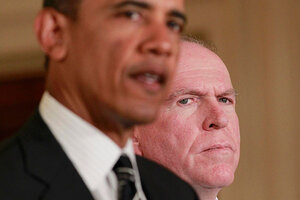With John Brennan, Obama doubles down on drone strikes
President Obama wants John Brennan to head the CIA. In the confirmation process, he could face questions from the left and right about his past at the CIA and his vision for the war on terror.

White House counterterrorism adviser John Brennan (r.) listens as President Obama announces his nomination as the new CIA director at the White House in Washington Monday.
Jason Reed/Reuters
WASHINGTON
President Obama’s nomination Monday of John Brennan, the architect of his drone war, to head the CIA suggests the deadly but controversial counterterrorism approach will not just continue but perhaps even expand.
Mr. Brennan, a former CIA officer who has served as Mr. Obama’s counterterrorism adviser for four years, has overseen a broad expansion of the use of drones to carry out targeted killings in Pakistan, Yemen, and Somalia. In fact, it was Brennan who first publicly acknowledged the Obama administration’s drone war, calling the strikes “legal, ethical, and wise” as a means of deterring terrorist attacks.
Under Obama, more than 300 drone strikes have reportedly killed more than 2,500 people – many of them Al Qaeda leaders or other dangerous terrorists, according to the US government. But critics of the program say the attacks breed deeper resentment against the US, target uncharged suspects, and are unethical because they often result in civilian casualties – a claim Brennan has refuted.
Speaking at the White House Monday afternoon, Obama also announced the nomination of former Republican Sen. Chuck Hagel to replace Secretary of Defense Leon Panetta.
The Hagel-Brennan nominations, along with the nomination of Democratic Sen. John Kerry as secretary of State, suggest the continuation of a pragmatic and cautious foreign and national-security policy. Instead of boots-on-the-ground interventions, Obama would seem to want to expand the use of both remote strikes and Special Forces operations in the fight against Islamist terrorism.
In Washington, the Hagel nomination is seen as the most controversial of the three, with some Republicans accusing the former Nebraska senator of weaknesses – in his commitment to Israel and in his stance toward Iran and its advancing nuclear program. But Brennan’s Senate confirmation is likely to encounter a few bumps of its own.
“The great paradox here is that Hagel will face his opposition from the right, while Brennan’s will largely come from the left,” says Lawrence Korb, a defense policy expert at the Center for American Progress in Washington, who served in the Pentagon under the Reagan administration.
The drone-strike program – largely carried out in secret by the CIA – and other aggressive but clandestine counterterrorism operations could give Brennan the most trouble.
His CIA past has caused complications before. In 2009, when Brennan was a senior CIA official, he withdrew his name from consideration for the top CIA post because Democrats considered him too close to the George W. Bush administration’s “enhanced interrogation techniques,” including waterboarding.
While in the White House as an Obama adviser, Brennan has come in for both praise and criticism from human-rights activists.
He earned positive marks for his calls to close the detention facility at Guantanamo Bay, Cuba. But he has come under attack for his claims that the stepped-up drone strikes have not resulted in “collateral damage” or civilian deaths.
To counter those claims, critics have circulated video of strikes on villages, including a December 2009 drone strike on a Bedouin camp in Yemen. And they highlight the case of Abdulrahman al-Awlaki – the son of deceased Al Qaeda in the Arabian Peninsula leader Anwar al-Awlaki – who was killed in a drone strike in Yemen last October. Under the Obama administration, the US considers military-age males in a drone strike zone to be combatants and not civilians, but critics say Abdulrahman al-Awlaki was an average teenage boy and not a militant.
The qualms about Brennan from the left don’t mean he won’t face questions from the right.
Republicans are expected to question Brennan about White House leaks of classified accounts of intelligence operations. Republicans suggest that the leaks, which emerged during last year’s presidential campaign, were intended to portray Obama as engaged, decisive, and resolute on national security issues.
Beyond that, some Republicans see Obama's security policy as overly reliant on drones and special operations.
“We’re perfectly happy with using drones and special operations – whether it’s the military or the CIA – to target radical Islamists who are carrying out terrorism, but the problem we see is the over-reliance on these two capabilities,” says Steven Bucci, director of foreign policy studies at the Heritage Foundation in Washington. “Neither of them is a panacea,” he adds, “and their overuse … means you could be allowing the military to atrophy.”
Brennan's background is likely to reassure some doubters. He spent 25 years in the CIA both as an analyst and in operations, leaving in 2005 to form a private consulting company. Moreover, he is the man behind Obama’s successful campaign targeting Al Qaeda leadership, and he was at the president’s side as Obama gave the green light to take down Osama bin Laden in May 2011.
Still, Mr. Bucci says he anticipates that some senators, concerned about a waning determination “to fight the war on terror,” will want to know where the administration is headed in the battle with radical Islamists.
They are likely to question Brennan about “a push afoot to return the war on terror to the realm of law enforcement … the way the Clinton administration saw it. That,” he adds, “would be disastrous.”

